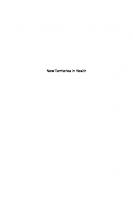Charting New Territories History and Geography's Dynamic Journey in Modern Education
Charting New Territories History and Geography's Dynamic Journey in Modern Education
118 64 817KB
English Pages [10] Year 2023
Recommend Papers
File loading please wait...
Citation preview
Dr zeroual khalid ²° Université Mohammed V de Rabat
11/21/23
Ecole normale Superieure
Charting New Territories: History and Geography's Dynamic Journey in Modern Education
Dr. zeroual khalid²° 2 Université Mohammed V de Rabat
°Faculté des sciences de Rabat Département histoire et géographie
Latest Research articles from Dr. Khalid zeroual
In the ever-evolving landscape of education, the realms of history and geography stand as vital pillars, offering windows into the past, lenses to understand the present, and compasses to navigate the future. Central to their potency is the evolving approach to embracing diverse viewpoints, weaving inclusivity into the fabric of these disciplines. Within the corridors of history and the expanses of geography, the narrative of our world has often been presented through a singular lens. However, today's educational ethos underscores the imperative of embracing varied narratives and amplifying voices that have long remained marginalized. In doing so, we unlock our shared human experience, weaving together a comprehensive understanding that reflects the tapestry of cultures, perspectives, and histories. We embark on an exploration of this pivotal shift towards inclusivity in historical and geographical studies. We delve into the significance of incorporating diverse narratives, weaving together the threads of previously unheard voices to create a mosaic that paints a truer picture of our collective heritage. Through initiatives that champion inclusivity, we witness the transformative power of education. These initiatives, ranging from grassroots movements to institutional reforms, serve as beacons illuminating the path toward a more inclusive educational landscape. They empower students to engage with history and geography in ways that resonate with their diverse backgrounds, fostering a sense of belonging and ownership over their learning journey. Moreover, as the digital age unfolds, history and geography education stand at the precipice of an unparalleled revolution. Technological advancements have become catalysts for change, expanding access to historical archives, geographical data, and interactive learning experiences. From digital repositories to immersive virtual tours, these tools not only democratize access but also foster global connectivity, erasing geographical boundaries and inviting learners into a shared space of knowledge and exploration. As educators endeavor to cultivate critical thinking skills, inquiry-based learning, and practical application, history and geography serve as fertile grounds for nurturing these abilities. Through engaging Latest Research articles from Dr. Khalid zeroual
projects and experiences that bridge theory with practice, students are empowered to become active participants in unraveling the mysteries of the past and deciphering the complexities of our present world. Join us on a journey through the transformative landscapes of history and geography education, where inclusivity, technological innovation, and practical engagement converge to shape the minds and perspectives of tomorrow's global citizens. We give the multifaceted aspects of history and geography education, emphasizing the importance of inclusivity, technological advancements, and practical application in shaping a comprehensive understanding of our world
Latest Research articles from Dr. Khalid zeroual
Latest Research articles from Dr. Khalid zeroual
Incorporating diverse narratives and amplifying previously marginalized voices within history and geography education holds profound significance. It transcends the mere inclusion of varied perspectives; it redefines the very essence of learning. By embracing narratives from different cultures, ethnicities, genders, and socio-economic backgrounds, education becomes the complexity of our global heritage. Through the inclusion of diverse narratives, educators unearth untold stories that have long languished in the peripheries of traditional curricula. These stories, often obscured by dominant historical or geographical accounts, offer invaluable insights into lesser-known events, achievements, and struggles that have shaped societies and landscapes. Incorporating diverse narratives fosters empathy and understanding among students. It encourages them to view historical events and geographical contexts through multiple lenses, enabling a deeper appreciation of the interconnectedness of human experiences across time and space. Educational institutions worldwide are embracing curriculum reforms aimed at diversifying historical and geographical content. These reforms integrate narratives from various cultures and regions, ensuring a more comprehensive representation of global history and geography. Initiatives promoting community engagement bring local histories and geographical features into the educational sphere.
Latest Research articles from Dr. Khalid zeroual
Collaborative projects with community leaders, historians, and geographers offer students opportunities to explore and document local narratives, preserving and honoring diverse heritage. Schools and academic institutions organize speaker series, workshops, and seminars featuring diverse voices in history and geography. These events provide platforms for underrepresented scholars, activists, and experts to share their insights, enriching students' understanding and broadening their perspectives. Efforts to diversify educational resources, including books, articles, films, and digital materials, ensure access to a wide array of perspectives. Initiatives focus on expanding libraries and online repositories with materials that represent diverse narratives, enabling students to engage with a broader spectrum of historical and geographical content. Educators are adopting culturally responsive teaching practices, acknowledging and incorporating students' cultural backgrounds into the learning process. These practices create inclusive learning environments that validate diverse experiences and perspectives. Technology has revolutionized the accessibility of historical and geographical knowledge. Online archives, digitised documents, and databases grant unprecedented access to historical records, maps, and geographical data. This democratization eliminates geographical barriers, allowing learners worldwide to explore and engage with diverse historical and geographical content. Digital tools and online resources offer interactive learning experiences that transcend traditional textbooks. Educational platforms provide immersive simulations, interactive maps, and multimedia content, enabling students to explore historical events and geographical features in engaging and dynamic ways. Latest experiences have redefined field trips, offering students immersive journeys to historical sites, landmarks, and diverse geographical locations. Through latest tours, students can give ancient civilizations, wonders, and cultural sites, fostering a deeper understanding of global diversity and heritage. GIS technology allows students to analyze and visualize geographical data, enabling them to understand spatial relationships, patterns, and trends. It empowers learners to create maps, conduct Latest Research articles from Dr. Khalid zeroual
spatial analysis, and geographical phenomena, fostering a deeper comprehension of landscapes and human-environment interactions. Digital platforms facilitate collaborative projects that transcend borders. Students can engage in joint historical or geographical initiatives with peers from diverse cultural backgrounds, exchanging perspectives and collectively giving global topics, promoting crosscultural understanding. The proliferation of open-access educational resources, including online libraries, documentaries, podcasts, and academic journals, broadens the scope of historical and geographical knowledge. These resources, often freely available, enhance global awareness by offering diverse perspectives and information. Social media platforms and online communities serve as spaces for sharing historical insights, geographical discoveries, and cultural exchanges. These spaces foster connections among learners, educators, and experts worldwide, creating avenues for collaborative learning and global dialogue. History and geography education often adopt inquiry-based learning approaches. Students are encouraged to ask questions, analyze sources, and evaluate multiple perspectives. This method nurtures critical thinking by challenging students to give complexities and draw informed conclusions based on evidence. Students engage in analyzing historical patterns and geographical trends. They learn to identify cause-and-effect relationships, recognize recurring themes in historical events, and understand the implications of geographical changes over time. This analytical process focuses their critical thinking abilities. History and geography lessons extend beyond the classroom, emphasizing real-world applications. Students examine current events through historical and geographical lenses, connecting past occurrences and geographical contexts to contemporary issues, fostering a deeper understanding of their significance. Students undertake historical research projects where they give specific events, eras, or individuals. They delve into sources, conduct interviews, and analyze data to create comprehensive historical narratives. These projects encourage critical analysis and historical interpretation. Field studies in geography involve students giving local environments, conducting surveys, and analyzing geographical features. They create maps, investigate environmental changes, or propose solutions to real-world geographical challenges, applying their knowledge practically. Educators employ simulations and role-playing exercises based on historical events or geographical scenarios. Students take on roles, analyze situations, and make decisions as historical figures or stakeholders in geographical contexts, fostering critical thinking and empathy. Latest Research articles from Dr. Khalid zeroual
Collaborative projects with local communities integrate historical or geographical studies with community needs. Students work on initiatives such as documenting local history, mapping neighborhood resources, or addressing environmental concerns, applying their knowledge to real-life situations. Students create digital storytelling or multimedia projects that intertwine historical events or geographical concepts with modern mediums. They produce videos, podcasts, or interactive presentations, synthesizing information and presenting it in engaging formats.
Latest Research articles from Dr. Khalid zeroual
Digital tools enhance global connectivity, offering immersive virtual tours, interactive maps, and platforms for collaborative. Innovative teaching practices promote critical thinking, inquiry-based learning, and real-world application. Projects and experiences bridge theory and practice, preparing students to navigate complexities and become activeness global citizens. History and geography education, when integrated with peace education principles without world war 3, form a powerful tool for cultivating a culture of peace. By imparting knowledge, fostering critical thinking, promoting empathy, and nurturing a global perspective. When approached with an emphasis on inclusivity, interdisciplinary connections, technological integration, and practical application, history and geography education contribute significantly to shaping individuals equipped to actively work towards a more peaceful world.The evolving landscape of history and geography education underscores the importance of preparing students for a complex, interconnected world. Through diverse perspectives, interdisciplinary approaches, technological integration, and practical applications, educators equip learners with critical skills, empathy, and a nuanced understanding of our global society. By embracing diversity, fostering interdisciplinary connections, leveraging technology, and promoting practical engagement, history and geography education become transformative forces, empowering students to navigate a dynamic world with peace, curiosity, empathy, and informed perspectives.
Latest Research articles from Dr. Khalid zeroual




![Dynamic Repetition: History and Messianism in Modern Jewish Thought [1 ed.]
9781684581030, 9781684581047](https://ebin.pub/img/200x200/dynamic-repetition-history-and-messianism-in-modern-jewish-thought-1nbsped-9781684581030-9781684581047.jpg)

![The Doctoral Journey in Dance Education and Drama Education : Reflections on Doctoral Studies by Dance and Drama Educators in Australia and New Zealand [1 ed.]
9781922454355, 9781921875991](https://ebin.pub/img/200x200/the-doctoral-journey-in-dance-education-and-drama-education-reflections-on-doctoral-studies-by-dance-and-drama-educators-in-australia-and-new-zealand-1nbsped-9781922454355-9781921875991.jpg)



